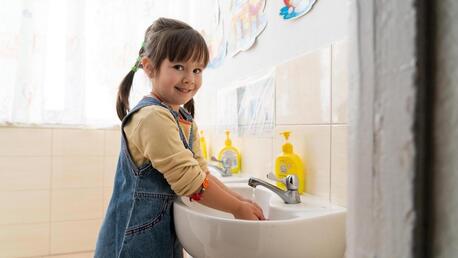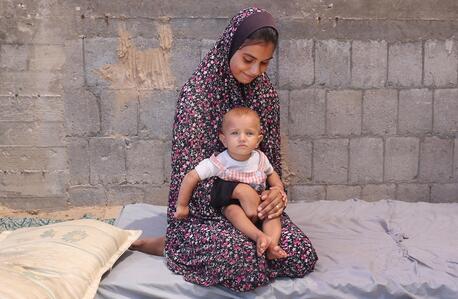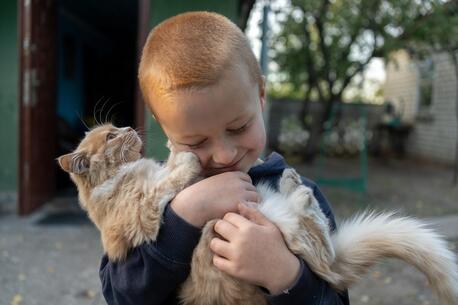
UNICEF Repairs Water Systems to Keep Kids Learning in Ukraine
After two years of war, UNICEF is working with partners to repair damaged water and sanitation infrastructure across Ukraine.
Aging and under attack, Ukraine's water and sewage systems are in urgent need of repair
Art class is underway at a kindergarten in Vasylkiv, a city in central Ukraine. Young children paint clouds and raindrops with their brushes, before rinsing them in a glass of water. Afterward, they wash the paint from their hands at the sink. But getting water hasn't always been this easy. A few months ago, the water supply at the school was repeatedly cut off.
The city of Vasylkiv has one of the most problematic water supply systems in Ukraine’s Kyivska region. The century-old metal pipes are worn out, and the water itself has a high iron content. Breakdowns are frequent, and city residents can be left without water for days. Once the water returns, it is the color of rust.

Schools need working water and sanitation to function properly
Not only is Vasylkiv's water infrastructure old and failing, it's also under attack. Two years of war have severely damaged Ukraine's water infrastructure — by the end of 2023, constant shelling had destroyed more than 621 miles of water networks across the country. The city's municipal waterworks have been hit repeatedly.
"Without water supply, the kindergarten was not be able to operate," says Yevheniia Sukhetska, a nurse at the school. "Our work is directly related to water: cooking, hygiene procedures, laundry, et cetera. In addition, children need to be in sanitary rooms.”
Recently, UNICEF financed the replacement of emergency water and sewage lines in one of Vasylkiv's districts. Upon completion of the works, the water supply was restored for 2,455 inhabitants, as well as to schools, kindergartens and health care facilities. Watch the video to see what a difference water makes.
A reliable water supply helps keep children safe and healthy at school
Inna, the mother of 6-year-old Myroslava, was worried about her daughter during these emergency water shutdowns.
"If I found out about the water being cut off in the kindergarten during the day, I was worried that they would not bring enough water, and it would be uncomfortable for my child,” says Inna. “I had to pick up my daughter earlier. And if there was no water for more than a day, I had to leave her at home."
As a mother, it is important for Inna that the kindergarten complies with sanitary standards. And without water, this is virtually impossible.

Before repairs, trucked-in water served as a stopgap measure
Before the repairs, Sukhetska says the water supply at the kindergarten would stop once or twice a month. To get by, the Department of Education provided water by truck and the staff carried water into the kindergarten.
"Since the renovation, we have had no problems with water supply,” she says. “Filters have been installed in the canteen. We boil water afterward and then give it to the children to drink. This way, our children have access to drinking water throughout the day.”

UNICEF is working to ensure that all Ukraine's children have safe, clean water
Bohdan Shevchuk, secretary of Vasylkiv City Council, says that providing water to residents is one of the council’s most difficult tasks. Many Vasylkiv residents complain about low water pressure on the upper floors of apartment blocks, poor water quality and frequent pipe breaks.
"Thanks to UNICEF, we repaired the most problematic section. We spent up to 10 percent of all the resources that the city invested in the repair of the water supply system," says Shevchuk. "There were up to 20 breakthroughs every month.”
As part of the repairs, old pipes were replaced with modern ones. As a result, the city saves money that was spent on repairing constant breakdowns and optimizes the work of service employees.

In 2023, UNICEF repairs to damaged infrastructure in Ukraine provided around 3 million people with access to water services
"The health of our residents is our priority,” says Shevchuk. “Thanks to the repairs, the residents of the neighborhoods where the pipes were replaced now receive high-quality water.”
UNICEF works to ensure that all children across Ukraine have access to an uninterrupted supply of clean water, meeting their hygiene and nutrition needs. In 2023, with the support of Belgium and other partners, UNICEF provided access to water services to approximately 3 million people by restoring damaged infrastructure. UNICEF is also supplying water treatment equipment and chemicals to water utilities.
Every child has the right to a safe and healthy childhood. Your support for UNICEF can make a difference in the lives of children growing up in difficult circumstances around the world. Please donate.
HOW TO HELP
There are many ways to make a difference
War, famine, poverty, natural disasters — threats to the world's children keep coming. But UNICEF won't stop working to keep children healthy and safe.
UNICEF works in over 190 countries and territories — more places than any other children's organization. UNICEF has the world's largest humanitarian warehouse and, when disaster strikes, can get supplies almost anywhere within 72 hours. Constantly innovating, always advocating for a better world for children, UNICEF works to ensure that every child can grow up healthy, educated, protected and respected.
Would you like to help give all children the opportunity to reach their full potential? There are many ways to get involved.





